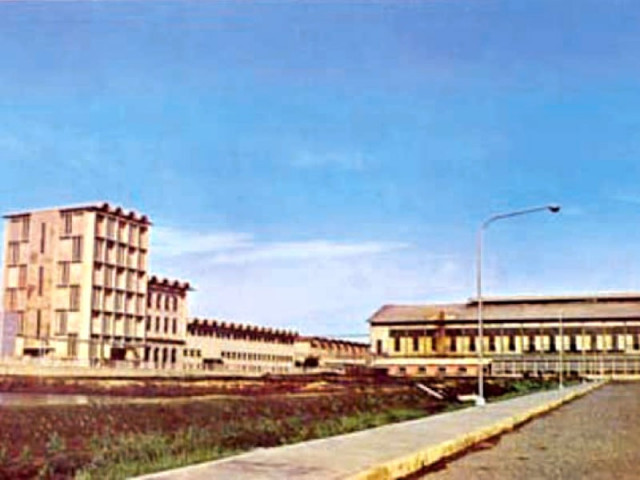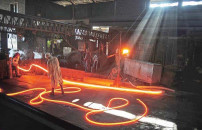Shifting trends: Economic boom shuts down Faisalabad’s oldest sugar mill
Crescent Sugar Mills closed to make way for residential real estate development.

The Crescent Sugar Mills and Distillery is a victim of its hometown’s success: as Faisalabad has grown richer over the past few decades, the factory has found it difficult to keep pace with the changes, and has been forced to shut down its sugar refining operations.
Crescent is one of the oldest sugar mills in the country, first incorporated in 1959. It was first listed on the Karachi Stock Exchange in November 1965. But in 2010, after just over 50 years in operation, the board of directors finally decided to shut down its sugar refining operations and move their capital into manufacturing cotton yarn and real estate development.
Yet unlike stories of most other business shutdowns, Crescent Sugar Mills’ decline came not because of economic slowdown, but rather the economic success of the city – and especially the neighbourhood – it is located in. The factory is 100-acre complex in Nishatabad, a neighbourhood in Faisalabad that used to be on the outskirts of the city, but has increasingly become host to residences that house the city’s growing affluent middle class.
In the 1960s, Nishatabad was on the outskirts of the city, which allowed farmers to bring their sugar cane to the factory easily, using large trailers and trucks. As the decades wore on and Faisalabad’s middle class grew, however, many of the outer areas of the city began going through gentrification, and became residential neighbourhoods.
With the advent of more residences, the city government began placing restrictions on the movement of trucks and trailers that brought in the sugarcane to the factory. Many of the roads that had been used by the trucks were blocked off altogether for heavy traffic. As a result, the company’s logistics cost increased significantly, making it difficult for the mill to compete in the highly commoditised sugar market.
“With every passing crushing season, our mill’s financial health was going from bad to worse. We had no choice but to close down the unit permanently,” said Naveed Gulzar, a director at Crescent Sugar Mills.
But the higher transportation cost appears to be only one reason for the mill’s closure. Another, more compelling reason, appears to be the gentrification of the neighbourhood itself. The Crescent Group owns 150 acres in Nishatabad, with the sugar mill taking up 100 acres and a paper board mill (shut down about a decade ago) taking up the remaining land.
While both of these businesses were going through squeezed margins, the value of the real estate on which they were sitting was skyrocketing. At a certain point, it no longer made sense to manufacture low-margin commodities on prime residential real estate less than 10 minutes drive from the Faisalabad city centre.
And so the group has decided to shut down the factory, sell off the machinery, bulldoze the factory buildings and instead construct a residential colony, with all sorts of amenities, including a shopping mall, a hospital, schools, and colleges, said Gulzar.
The Crescent Group is not looking to exit the manufacturing business altogether but will no longer be in the sugar business. Instead, the board of directors has decided to open up a cotton spinning mill – that manufactures cotton yarn – for export. The factory, however, will be in a rural area, for which the group has already bought land.
“This land is too expensive to set up a factory here,” said Gulzar. “It is prime Faisalabad real estate.”
The group already has other cotton spinning units, so this is not an alien line of business for Crescent. Gulzar claimed that the Crescent Group was the largest exporter of Pakistani cotton yarn and cloth, with China as its single biggest buyer. Pakistan exported about $1.5 billion worth of cotton yarn to China in 2011.
Published in The Express Tribune, September 11th, 2012.



















COMMENTS
Comments are moderated and generally will be posted if they are on-topic and not abusive.
For more information, please see our Comments FAQ